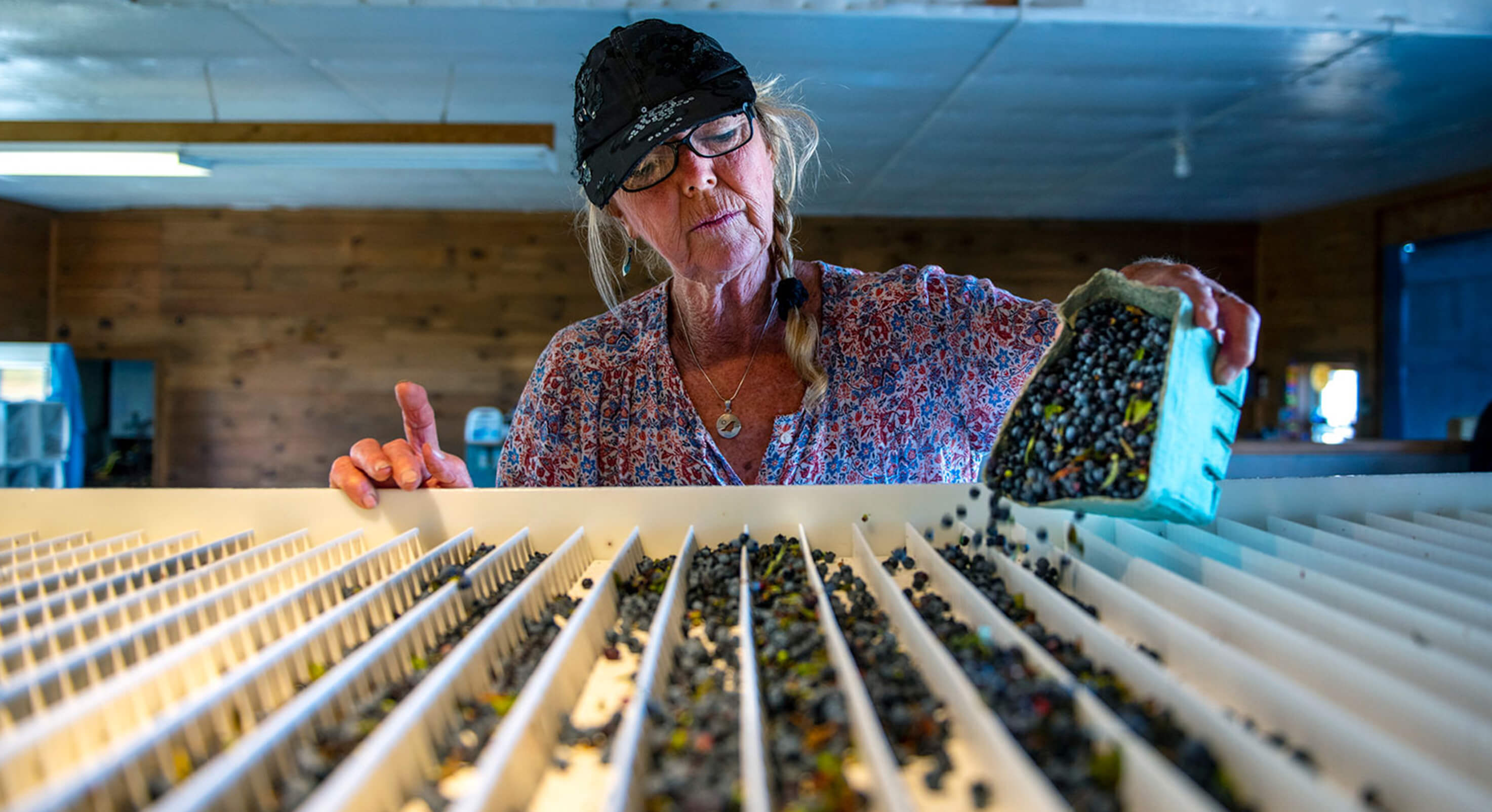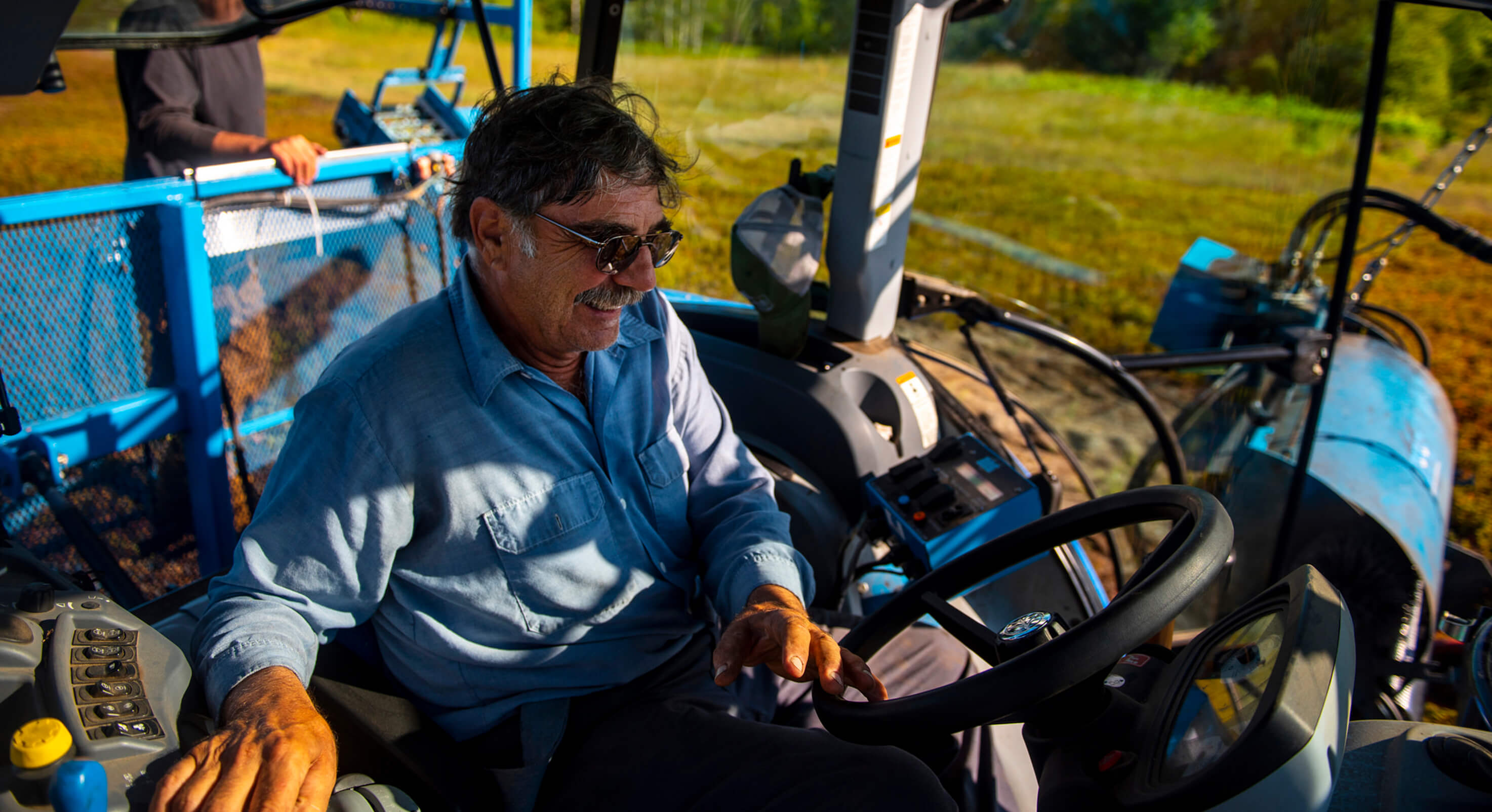Last summer, Shannon Lion left a voicemail on David Yarborough’s office phone. She and her husband Steven had a weed in their blueberry barrens that they couldn’t identify. Could she drop the plant by next time she came to town so Yarborough could take a look?
“We have new weeds annually,” says Shannon. “A lot of weed (seeds) I bring in on my pickup truck, I swear.”
The mystery invader seems particularly alien in the pristine setting of Sunkhaze Wild Blueberry Farm in Township 32 — 347 acres, nearly half of which are flat, naturally rock-free barrens high on a sand and gravel ridge, or esker, next to Sunkhaze Stream.

The 8 miles of open fields, cleared first by a wildfire in the 1920s, also sit atop an aquifer. The result is what many consider some of the state’s best wild blueberries for their size and flavor.
Unlike most Maine wild blueberry growers, the Lions live on their barrens. They also live off the grid, only buying a generator a few years ago to keep a small freezer operating in their fresh pack building.
“We spend a lot of money on blueberries, but not a lot on life,” jokes Shannon, who serves on the advisory board of the Wild Blueberry Commission of Maine. “We’ve never taken a vacation off the farm. Both of us traveled quite a bit (when we were young). The only thing stranger than that is we have no refrigerator.
“It’s a beautiful life, like heaven on Earth because both of us want to be here,” says Shannon. “We always knew what we wanted to have, and we have it now. It would be the worst place in the world if we didn’t want to be here with one other person. Sometimes you don’t see anyone (else) out here for months at a time, and you have to be comfortable with that.”
“It was a long time before the farm made money. For many years, to break even and make payments was doing good.” Steven Lion
What is plentiful is the wildlife, including black bears, prompting installation of a solar-powered electric fence around the beehives they rent to accommodate the other critical partners in their blueberry business — pollinators.
It has taken the Lions nearly a half-century to bring their fields, purchased in 1974, to their current production levels. In the early years, Shannon had a job off the farm to help with expenses.
“It was a long time before the farm made money,” Steven says. “For many years, to break even and make payments was doing good.”
Wild blueberries are the primary crop for the Lions — hand-raked for fresh-pack sales and for a Maine winery, and machine harvested for Wyman’s of Maine frozen fruit sales. For two decades, they also have been sustainably harvesting blueberry sod for the ornamental landscape market.
The crop diversification provided the flexibility to pay in May, June and July for the fertilizer and other expenses needed for the fields that would be harvested the following year, rather than having to get a loan and wait for the final year-end, per-pound price, reflected in the check from the processing company.
Another milestone for the Lions, as for many Maine wild blueberry growers, was the switch from hand raking to mechanical harvesting by the late 1990s. The quality of the Lions’ rock-free barrens spurred their mortgage company to suggest the investment in a harvester. The expense ran counter to the Lions’ frugal nature, but it was time.

The days were quickly disappearing when a large field crew “just showed up to rake,” usually camping on the farm to get the crop in during the three-week harvest window. As most private growers who were in business in the late 1990s will attest, it was difficult to meet the daily needs of what was increasingly and largely an untrained, seasonal workforce in a rural setting, in addition to harvesting a quality crop.
Today, with two harvesters operating 14 hours a day in the fields for up to three weeks, the Lions bring in their crop with the help of about eight workers — longtime employees, and their spouses and children.
“They come back every year, taking time off from their jobs,” says Shannon of the Sunkhaze workers who are more like family than employees.
A few weeks after the harvest is in, the multitudes of blueberry clones take on varied hues of scarlet. The Lions mow the barrens for plant health and weed control once the leaves fall off later in the season. The switch from burning to mowing fields was a big milestone for Maine wild blueberry growers, including the Lions.
But it also added a wrinkle in the ongoing battle for weed control. Shannon says they have noted the weed pressure — battles through the years with woody weeds and milkweed, in particular — after switching to flail mowing. Burning the barrens killed the weed seeds.
“We’re just lucky to have people like Dave (Yarborough) and (UMaine entomologist) Frank (Drummond), the bug guy,” Shannon says. “(I always) get a call back when I have a question, and I always have questions. We’re not on the internet and don’t do computers, It’s nicer to call Dave and get the answers.”
